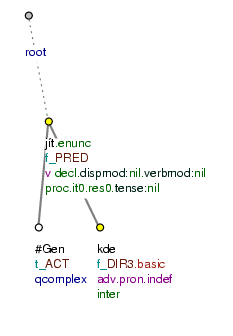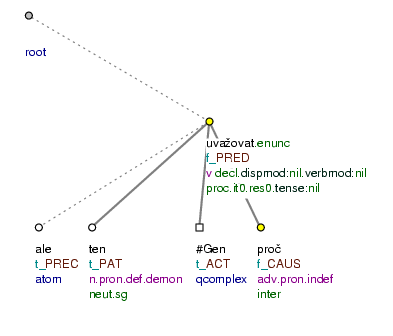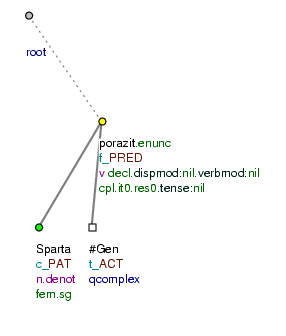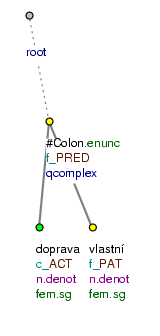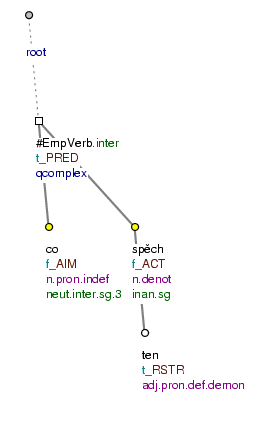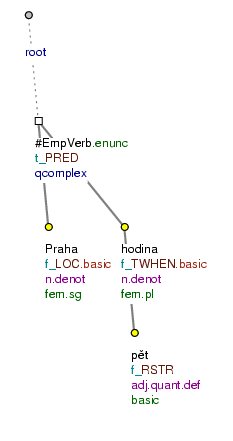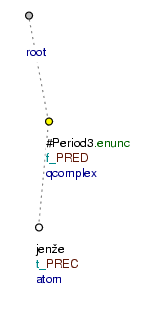Non-verbal clauses are explicitly defined (see Section 4.2, "Non-verbal clauses"). All other clauses are considered verbal.
The effective root node of a verbal clause is a node representing the governing predicate (which is usually a verb) of the clause. If there is no such verb expressed in the surface structure of the sentence, nor is the verb ellided (i.e. the node for the verb cannot be copied) and no punctuation mark can be considered the governing predicate either (see below), the effective root node of the verbal clause is represented by a newly established node with the t-lemma #EmpVerb (see also Section 12.1.1, "Ellipsis of the governing verb").
The effective root node of an independent verbal clause has the functor PRED (see also Section 1.1, "PRED"). If the independent verbal clause is a parenthesis, its effective root node has the functor PAR (see Section 1.5, "PAR"). The effective root nodes of dependent verbal clauses are assigned functors decribing their dependency relations w.r.t. their governing nodes.
The effective root node of a verbal clause (the predicate) can be a node representing:
-
a finite verb form.
The most common case of a verbal clause is the case in which the predicate is a finite verb form or when the verb is ellided (see Section 12.1.1.1, "Textual ellipsis of the governing verb").
Examples:
Proč o tom uvažujeme.
PRED? (=Why do we think about it?)(Pražští studenti se sejdou na Vyšehradě.) Brněnští { se sejdou.
PRED} na Petrově. (=(The Prague students will meet at Vyšehrad.) Those in Brno will meet at Petrov) -
an interjection.
The effective root node of a verbal clause can also be a node representing an interjection - in case the interjection has the role a verbal predicate in the clause.
Examples:
Hrr.
PREDna ně. (=Now for them!)Zvolal: Hrr.
PATna ně. (=He exclaimed: Now for them!) -
infinitive or participle.
A node representing an infinitive or participle is the effective root node of a verbal clause in case the infinitive or participle occupy the position of the finite verb form in the clause (i.e. they play the role of a verbal predicate).
Examples:
Kam jít.
PRED? (=lit. Where to_go?) Fig. 6.21Ale proč o tom uvažovat.
PRED! (=lit. But why about it to_think!) Fig. 6.22Sparta poražena.
PRED! (=Sparta defeated!) Fig. 6.23Být.
PREDtak o deset let mladší. (=lit. To_be so by ten years younger)Nemluvit.
PRED! (=lit. Not_to_speak!)Deset let poslouchat.
PREDtotéž. (=lit. Ten years to_listen the_same)Nevíme, kam jít.
PAT(=We don't know where to go)For the rules for annotation of dependent infinitival and participial constructions see Section 5.1.1, "Dependent infinitival constructions" and Section 5.1.2, "Dependent participial constructions".
Infinitival (as well as participial) constructions usually express certain modal meanings (the construction is a wish, exclamation etc.) Cf.:
-
Ale proč o tom uvažovat. (=lit. But why about it to_think!)
= Why should we think about it.
-
Deset let poslouchat totéž. (=lit. Ten years to_listen the_same)
= I have to listen to the same things for ten years.
!!! The modal meanings of infinitival and participial constructions have not been captured in PDT so far: the nodes representing the infinitive or participle have the
declvalue in theirdeontmodgrammateme (see Section 5.10, "Thedeontmodgrammateme (deontic modality)") -
-
punctuation.
The effective root of a verbal clause is a node representing a punctuation mark in those cases when no verb is present in the clause (and it is not just ellided) and, simultaneously, if the punctuation plays the role of the predicate. Usually a simple verb could be inserted into such constructions (typically the verb být (=be)) and it is also possible to determine the syntactic functions of the individual dependent lexical units w.r.t. the absent verb; in this, this kind of construction differs from (superficially similar) cases of coordination or apposition (e.g.: Josef Novák, Praha; see also Section 4.2, "Non-verbal clauses").
Examples:
Doprava: vlastní. [
#Colon.PRED] (=lit. Transportation: own) Fig. 6.24Mladost - radost. [
#Dash.PRED] (=lit. Youth - pleasure)Rozhodčí: Ulrich. [
#Colon.PRED] (=Referee: Ulrich)Obrázek: 4. [
#Colon.PRED] (=lit. Picture: 4)Zvolal: Mladost - radost. [
#Dash.PAT] (=lit. (He) exclaimed: Youth - pleasure)(režie: Stiller) [
#Colon.PAR] (=lit. (director: Stiller))NB! A node representing a punctuation mark is only considered the effective root node of a clause if it really has this function. If the construction that is considered verbal contains punctuation marks but none of them can be taken to be the predicate (e.g. V Praze, v pět hodin. (=in Praha, at five o'clock); cf. Fig. 6.26), the effective root node of the clause is a newly established node with the t-lemma substitute
#EmpVerb, not a node for the present punctuation mark. -
three dots.
The effective root node of a verbal clause can also be a node representing three dots; this happens in those cases when the clause (introduced by a connective) is left unfinished. If there are no three dots used in such a sentence, the effective root node is a newly established node with the t-lemma substitute
#EmpVerb.Examples:
Jenže... {
#Period3.PRED} (=But...) Fig. 6.27A přece... {
#Period3.PRED} (=And still...)Řekl, že ... {
#Period3.EFF} (=He said that...) -
a newly established node for an empty verb (the
#EmpVerbt-lemma).A newly established node for an empty verb (
#EmpVerb) is the effective root node of a verbal clause in those cases in which there is no verb present in the clause (and it is not just ellided) but in which the individual modifications occur in such forms like there was a verb in the clause. Usually a simple verb could be inserted into such constructions; however, this possibility is not a necessary condition for interpreting these constructions as verbal.Examples:
{
#EmpVerb.PRED} Nač ten spěch? (=lit. Why the hurry?) Fig. 6.25{
#EmpVerb.PRED} V Praze, v pět hodin. (=In Praha, at five o'clock) Fig. 6.26{
#EmpVerb.PRED} Vodu! (=Water!){
#EmpVerb.PRED} Samozřejmě. (=Of course)(Nač ten spěch?) (=lit. (Why the hurry?)) {
#EmpVerb.PAR}Zvolal: Nač ten spěch? {
#EmpVerb.PAT} (=lit. (He) exclaimed: Why the hurry?)These clauses, in which there is no verb present in the surface structure and it is not ellided either cannot be, however, considered non-verbal (according to the definition in Section 4.2, "Non-verbal clauses"), are called constructions with an empty verb.
For more on ellipsis of the main verb, see Section 12.1.1, "Ellipsis of the governing verb".
Fragmentation. Also those cases are considered verbal clauses (usually with an ellided verb) in which a modification having morphological characteristics of a dependent expression is left behind, i.e. is separated from the rest of the clause. If the governing node of the separated expression is a node corresponding to the syntactic nominative, the separated expression is represented as a non-verbal - nominative - clause (see Section 4.2, "Non-verbal clauses"). Cf.:
-
(Do práce dojíždím.) Až do Prahy. (=(I commute to work.) As far as to Praha)
= (Do práce dojíždím.) {dojíždět.
PRED} až do Prahy. -
(Přišel Petr, Pavel, Honza.) Jirka. (=lit. (Came Petr, Pavel, Honza.) Jirka.)
= (Přišel Petr, Pavel, Honza.) Jirka.
DENOM
!!! Cases of fragmentation are not marked in any special way in PDT.
